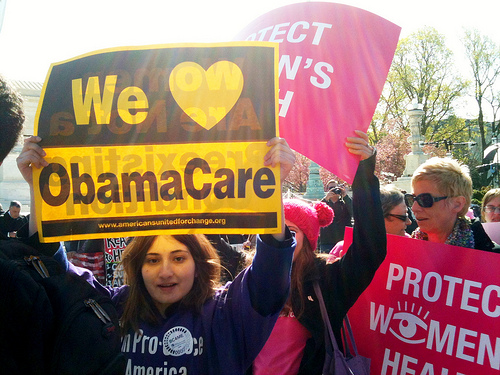Although the Supreme Court upheld the constitutionality of the individual mandate, it partially struck down the expansion of Medicaid under Obamacare. Here is John Roberts’ explanation:
Our cases have recognized limits on Congress’s power under the Spending Clause to secure state compliance with federal objectives. “We have repeatedly characterized…Spending Clause legislation as ‘much in the nature of a contract.'” The legitimacy of Congress’s exercise of the spending power “thus rests on whether the State voluntarily and knowingly accepts the terms of the ‘contract.'”
….Permitting the Federal Government to force the States to implement a federal program would threaten the political accountability key to our federal system….Spending Clause programs do not pose this danger when a State has a legitimate choice whether to accept the federal conditions in exchange for federal funds. In such a situation, state officials can fairly be held politically accountable for choosing to accept or refuse the federal offer. But when the State has no choice, the Federal Government can achieve its objectives without accountability.
….The States […] object that Congress has “crossed the line distinguishing encouragement from coercion,” in the way it has structured the [Medicaid] funding: Instead of simply refusing to grant the new funds to States that will not accept the new conditions, Congress has also threatened to withhold those States’ existing Medicaid funds. The States claim that this threat serves no purpose other than to force unwilling States to sign up for the dramatic expansion in health care coverage effected by the Act.
Given the nature of the threat and the programs at issue here, we must agree…In this case, the financial “inducement” Congress has chosen is much more than “relatively mild encouragement”—it is a gun to the head…A State that opts out of the Affordable Care Act’s expansion in health care coverage thus stands to lose not merely “a relatively small percentage” of its existing Medicaid funding, but all of it.
I actually find this partially compelling. Threatening to withhold all Medicaid funding if a state doesn’t participate in the new program is, as Roberts says, pretty close to being “a gun to the head.” But if you look at the actual funding levels enacted in the law, it’s more of a popgun than an AK-47. The feds will finance 100 percent of the Medicaid expansion through 2016, 93 to 95 percent through 2020, and 90 percent beyond 2020. So yes, the level of coercion is high, but the level of funding demanded of the states is very low. There’s both a carrot and a stick here.
Still, the court has ruled, and that’s that. Congress can set conditions for federal funding, but those conditions can’t include the loss of existing funds if a state chooses  not to participate in a new program. It’s not immediately clear how big an impact this will have going forward, since Congress still has some big sticks to persuade states to participate in federal programs, but it definitely blunts Congress’s power at least a little bit.
not to participate in a new program. It’s not immediately clear how big an impact this will have going forward, since Congress still has some big sticks to persuade states to participate in federal programs, but it definitely blunts Congress’s power at least a little bit.
In practice, what’s likely to happen here is pretty sad: Southern states, the very ones whose residents would gain the most from the new Medicaid provisions, are the most likely to opt out. The question is, how long will this last? Here, I’ll go out on a limb and suggest that they won’t hold out very long. There are a few reasons for this:
- Federal funding is 100 percent for the first three years. That’s going to be hard to resist.
- That 100 percent funding runs through 2016. Right now emotions are running high, but if Obama is reelected and it becomes obvious that Obamacare is here to stay, things will probably cool down. By 2014 or 2015, as the specter of jackbooted federal tyranny recedes, wiser heads may prevail.
- There’s going to be a lot of pressure from various interest groups to accept the funding. That includes pressure from within government agencies as well as from outside groups. After all, state and local governments are already on the hook for indigent healthcare, and that includes caring for those who fall in between the current Medicaid cutoff and ACA’s new one (roughly speaking, those who are between 50% and 133% of the poverty line). Even the stingy states may discover that they’re already spending enough money on that group that they’d be better off simply enrolling them all in Medicaid and paying their small share of the new benefits instead.
So we’ll see what happens. For now, I wouldn’t pay too much attention to whatever crowd-pleasing bluster we start hearing from (primarily) Southern governors. It’s election season, after all. Instead, wait until next year. If Romney wins, it’s probably moot. If Obama wins, expect opposition to the new rules to cool down over time. By the time Obamacare kicks in in 2014, the blusterers may be having second thoughts.


















